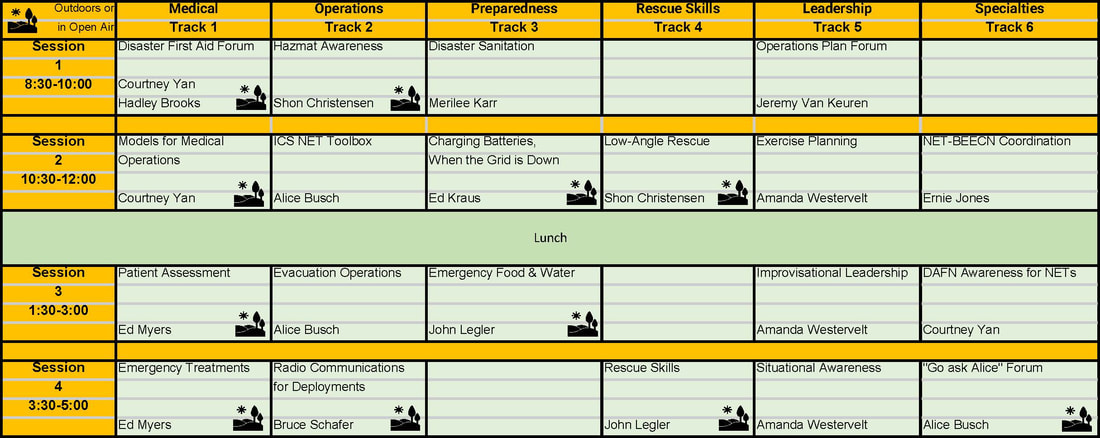Class Schedule & Descriptions From 2023.
We expect NETCamp 2024 to have a similar
schedule with multiple Tracks and 4 sessions on Saturday.
We expect NETCamp 2024 to have a similar
schedule with multiple Tracks and 4 sessions on Saturday.
NETCamp 2023 Class Schedule
Revision 2, July 23, 2023
Click the plus sign (+) next to each course title to view the course description.
|
SESSION 1
DISASTER FIRST AID FORUM
HADLEY BROOKS, WFR COURTNEY YAN, WFR Courtney & Hadley will facilitate an exploration into the differences between everyday first aid and disaster first aid, and why Wilderness First Aid training is such a good fit for NETs. Attendees will discuss the challenges of responding under disaster conditions, receive an overview of the full WFA course and experience some highlights of the training. HAZMAT AWARENESS
SHON CHRISTENSEN, LTH PORTLAND FIRE & RESCUE In NET Basic Training, we learn that Hazardous Materials are a STOP sign; however the simple truth is that these materials are being stored, transported and used in and around our neighborhoods. This class will provide you with a better understanding of these materials, how to locate them within your neighborhood and assess what their presence could mean in a disaster. Learn how to get the most from HAZMAT signage, how weather can affect a release, and how to best be prepared for this potential. DISASTER SANITATION: FUNDAMENTALS,
NEW ANSWERS, NEW QUESTIONS MERILEE KARR, M.D. Amazingly, Fecal-oral infections regularly kill more people in major disasters than the disaster itself. That’s because sanitation systems protect us from dangerous germs. When those systems break, we are exposed – but low-tech DIY replacements can save many lives. Learn how NETs can save more lives with Disaster Sanitation preparedness than any other intervention. For more information see my website, MerileeDeborahKarr.com. OPERATIONS PLANS forum
JEREMY VAN KEUREN PBEM community Resilience team mgr This session will focus on gathering workshop participant input on the relevant factors that go into a NET Operations Plan template. Jeremy will start by presenting the weighted index model for the BEECN system, since that model was a pilot for the Ops Plan template. Participants can prepare by reviewing prospective Ops Plan inputs, i.e., factors that determine a NET’s readiness for a disaster, at this WikiNET page. The goal of the session is to decide what the most important inputs are, and how heavily each should be weighed. SESSION 2
models for medical OPERATIONS
COURTNEY YAN, WFR FULL NET PPE REQUIRED In a disaster deployment, NETs may need to provide basic medical care of injured patients until they can be evacuated to an established care facility. In this class we'll walk through different models of medical operations, including Medical Treatment Areas and medical strike teams, and learn about key considerations for each such as physical set up, patient information and tracking, staff management, and logistics. ICS NET TOOLBOX
ALICE BUSCH MULTNOMAH COUNTY EMERGENCY MANAGEMENT PREREQUISITE: ICS 100 Join Alice in a discussion about how we can use Incident Command System tools in the immediate aftermath of a catastrophic disaster and in the hours and days that follow. There will be a focus on scene size up, concise reporting, and the What, When & How of documenting the different stages of response. Come prepared for a robust discussion and sharing of ideas and lessons. FEMA's ICS-100 is a required prerequisite for this course. CHARGING BATTERIES WHEN THE GRID IS DOWN
eD kRAUS, m.E. Batteries are the most essential part of any emergency power plan. It's much easier and faster to use the power in a battery than to recharge it. We will do hands on learning of battery charging by solar panels and by fuel generator. We'll learn the difference between a power supply and a charge controller, and how to maximize power input into your batteries when it becomes available. We will also discuss the differences between battery types and charge controller types. LOW-ANGLE RESCUE
SHON CHRISTENSEN, LT, PF&R FULL NET PPE REQUIRED This class will focus on low-angle rescue operations and equipment, which involves the towing of a survivor up a slope of less than 30 degrees. At higher angles, the survivor’s weight is supported predominantly by the rope, requiring greater rescuer training, ongoing practice and additional equipment. NETs are approved for low-angle rescue training only. All rescue equipment provided, however full NET PPE is required. Recommendations: Review your Basic NET Knots EXERCISE DESIGN, CONDUCT & EVALUATION
AMANDA WESTERVELT PBEM OPERATIONS SPECIALIST TRAINING & EXERCISE CO-LEAD Looking for something different to do with your NET Team? How about some exercises? Not the kind that find you at the gym. The kind that flex your NET Team muscles and help you prepare for The Big One (and any emergency that is less exciting). We’re going to talk about exercises you can do with your team, how to decide what your exercise should exercise, how to plan and prepare for an exercise, and why you should keep going and use what you learn to do it again. The goal of this class is to give you tools and ideas, and maybe even something to bring back to your team for that next meeting you don’t have a topic for yet. Prerequisite: review your NET team’s ops plan and bring it to class with you. If you don’t have one (no team and/or no plan), review the Pearl District NET Operations Plan instead. Pearl NET Ops Plan v1.2 (10-13-14) (portlandoregon.gov) NET-BEECN COORDINATION
ERNEST JONES, PBEM BEECN & AR0 PROGRAM COORDINATOR PREREQUISITE: BEECN TRAINING Join this presentation/discussion with BEECN program and NET amateur radio coordinator Ernest Jones. We’ll review BEECN and NET deployment protocols, different modes of communication and what volunteer responders can expect when deployed as members of either (or both) groups. If you are not BEECN trained, check MIP for the next training session. |
SESSION 3
PPATIENT ASSESSMENT:
A LIFE-SAVING INTERVENTION ED MYERS, MD, WFR Learn how to size up a scene, perform a primary assessment to identify and treat any immediate life threats, and perform a hands-on systematic secondary assessment to identify any other illnesses or injuries. We will also go over medical terminology and documentation. Students will work in teams. Some students will act as mock patients. If you have taken Wilderness First Aid, this class will be a refresher. If you have not yet taken WFA, this class will give you a head start. We will be outside so dress for the elements. Prerequisites: none Max 12 participants. EVACUATION OPERATIONS
ALICE BUSCH MULTNOMAH COUNTY EMERGENCY MANAGEMENT This class will explore the possible roles and risks for NETs in evacuation operations. After first reviewing the basics of evacuation levels, public messaging & alerts, the class with explore more deeply how NETs might prepare and respond to different scenarios. EMERGENCY FOOD & WATER
JOHN LEGLER, NET S&R INSTRUCTOR Examining both "Shelter in Place" and "Bugout" scenarios, thIs course gives you hands-on exposure to water purification & storage solutions as well as short-term, no-cook, and long term food storage solutions and use strategies. IMPROVISATIONAL LEADERSHIP
AMANDA WESTERVELT PBEM OPERATIONS SPECIALIST TRAINING & EXERCISE CO-LEAD As emergency response teams, we make plans: home fire escape plans, family reunification plans, communication plans, and, yes, NET Operations Plans. You know your plans. You know your place on the team. You train to your plans. But guess what? Incidents don’t follow plans. How do we handle the unexpected? How do we move beyond our plans to respond to what’s actually happening with the resources we’ve actually got? Maybe only two NETs deploy. Maybe your cache is locked and the person with the key can’t get to you. The goal of improvisational leadership is to bring us to a place where we can stop, survey our disappointment and discomfort, let go of the parts of the old plans that don’t fit, and work together in the chaos of an emergency to improvise successfully. No prerequisites. dafN* AWARENESS FOR NETS
*Disabilities, ACCESS Or FUNCTIONAL NEEDS People with disabilities, access or functional needs (DAFN) are disproportionately impacted by disasters, and are more likely to be excluded during planning, response and recovery. In this session, we'll discuss ways we can incorporate access and inclusivity into our NET preparedness and response activities. SESSION 4
EMERGENCY TREATMENT OF SEVERE ALLERGIC REACTIONS, OPIOID OVERDOSE, AND HYPOGLYCEMIA
ED MYERS, M.D., WFR Learn how to recognize and treat these life-threatening medical emergencies. We will cover administration of epinephrine by auto-injector (e.g. EpiPen or Adrenoclick) for anaphylaxis, Narcan (naloxone) nasal spray for opioid overdose, and glucagon auto-injector and nasal spray for severe hypoglycemia. Upon successful completion of this class, you will receive certificates authorizing you to administer epinephrine and glucagon (no certificate needed for naloxone). Prerequisite: none Max 12 participants. radio communications for deployments
bruce schafer Effective radio communications during a neighborhood NET deployment are essential to NET operations, such as Search & Rescue, Evacuation or Reunification. While communication with ECC and other agencies will be handled by ARO’s, NET tactical communications will be done largely through FRS/GMRS communications. This class will refresh your Basic Training radio skills, enhance your knowledge, skills, and confidence; and provide an opportunity for hands-on practice of what you have learned. Please bring an FRS or GMRS radio if you have one. If not, one will be provided for you. (max 12 participants) RESCUE SKILLS
JOHN LEGLER, NET S&R INSTRUCTOR FULL PPE REQUIRED This is an opportunity to refresh your search & rescue skills, from search markings, to extrication, to carries. Your input will help drive the directions we go. We'll also explore safe water rescue using a throw bag, rope toss a few essential knots, time permitting. SITUATIONAL AWARENESS
AMANDA WESTERVELT PBEM OPERATIONS SPECIALIST TRAINING & EXERCISE CO-LEAD Having and sharing information is critical to a successful deployment, but gaining and maintaining incident-level awareness is a skill. In the Incident Command System this would be the Situation Unit’s work: map and display creation and maintenance; weather monitoring; information gathering, verification, and analysis; anticipation of incident changes and patterns; and creation and sharing of related documentation. We will discuss ways to maintain meaningful situational awareness as a deployed NET Team, what information you might want to gather and how to record it, and how to maintain communication flow and situational awareness between shifts. There are no prerequisites for this class, but for a framework and understanding of the bigger response efforts you will be a part of in a large incident, I suggest you take ICS 100 - bonus if you take ICS 200, too. "go ask alice" forum
ALICE BUSCH MULTNOMAH COUNTY EMERGENCY MANAGEMENT Whether you are relatively new to Portland NET, or someone who has been active for many years, you have probably benefited from Alice's instruction & experience. So, this is your opportunity to ask a question that you may not have known to ask during your initial training. Whether it's triage, patient interaction, scene size-up or any of a variety of other subjects, Alice has agreed to honor our request for her to facilitate this open forum. No prerequisites. |
New, for the first time at NETCamp:
Coming soon!
Content
If you have questions, please contact us at [email protected]

